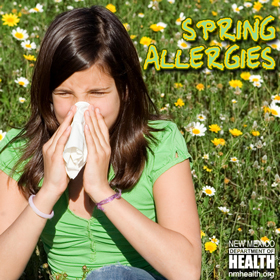Spring Allergies Nothing to Sneeze At

Ah, Spring! Flowers bloom. Trees grow new leaves. The weather warms up. What’s not to love about it? I’ll tell you what’s not to love: Massive wind gusts, pollen and dust blowing everywhere, runny noses and eyes getting all watery or puffy – and sometimes both.
When you have allergies, Spring is easy to love – and maybe even hate. I’m one of those people having to spend on over the counter allergy medication and consider myself lucky to not need a prescription, and odds are so are you too.
The Centers for Disease Control and Prevention (CDC) reports Allergies are the 6th leading cause of chronic illness in the US with an annual cost in excess of $18 billion.
The CDC describes allergies as “an overreaction of the immune system to substances that generally do not affect other individuals.” What triggers your allergies may not trigger me or the next person and so on.
But whatever it is, be it pollen, mold, dust, pet fur among other things, these substances can lead to us sneezing, coughing, even itching. Allergies have also been associated with chronic conditions like sinusitis and asthma – that means our allergic reactions range from just annoying to straight up life-threatening.
The New Mexico Department of Health every year is asked by residents and reporters alike what can people to prevent allergies. The answer, I’m sorry to say, is… nothing.
Researchers learned a long time ago with allergies you generally can’t prevent them; if you’re allergic, you’re allergic. The best any of us can do is find out what it is we’re allergic to and then try to avoid contact with it.
Contact your local allergist if you need help narrowing down what it is that sets your allergies off. Once you have it figured out, you’ll know what to avoid.
The typical strategies include staying in an air-conditioned environment during peak plant pollination season, avoiding certain foods, and eliminating dust mites and animal dander (your pet’s fur – even dead skin) from the home.
Other tips to reduce allergy symptoms include:

- Keep windows closed to reduce pollen entry into your home, car or workplace.
- Dust your home frequently with a damp cloth and use a vacuum with a HEPA filter.
- Wash your hands frequently or take a shower after being outside.
- Remove shoes when entering your home to minimize spreading pollen.
- Bathe and wash hair before going to bed.
To learn more about allergies and get tips for reducing symptoms, visit the Seasonal Allergies page of the Environmental Public Health Tracking website.
Media Contact
We would be happy to provide additional information about this press release. Simply contact David Morgan at 575-528-5197 (Office) or 575-649-0754 (Mobile) with your questions.

